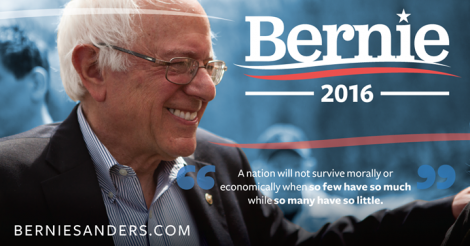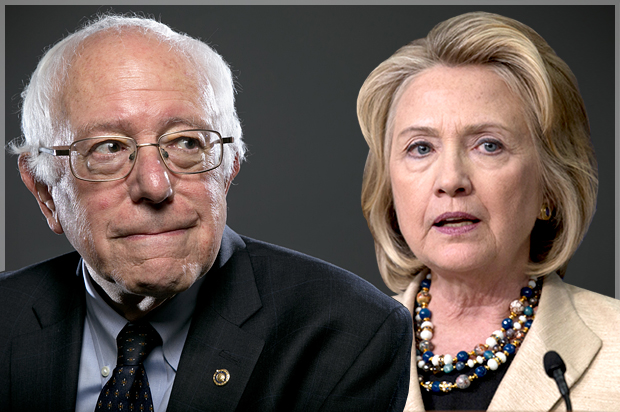PAUL REDGRAVE looks into Bernie Sanders and America’s democratic processes.
Nations often use the word democracy to justify the most egregious and undemocratic actions. The United States has a history of such misdeeds, both in its dealings with other countries and its own citizens. The ‘blood-dimmed tide’ of American imperialism has stained the span of the twentieth century with its injustices.
To take a few examples: America backed the 1982 invasion of Lebanon by Israel, resulting in the deaths of 20,000 people; and the invasion of Panama in 1989 and 1990 where 3,000 citizens were killed; as well as the intervention in Nicaragua in the 1980s and suppression of the leftist Sandinistas. These interventions were exercises in US power: the power of a dominating regime rather than the solicitous aid of a democracy. America has not been concerned with protecting these countries, but rather its own interests.

American support for oppressive regimes in North Africa and the Middle East is another, more subtle, demonstration of imperialism. The US sent around $2bn to Mubarak’s Egypt. As for Gaddafi, in Mark Ensalaco’s words, ‘the appeasement with Libya was always about petroleum, never about principle.’ Oil companies flocked there after economic sanctions were lifted in 2004. Clearly, economic interests were preeminent in the psyche of corporate America: the byword democracy was cast aside in the case of these dictators, as it benefitted corporate America to prop them up. During the Arab Spring, dictators like Mubarak and Gaddafi were toppled by their own people in the name of democracy.
Democracy does not function properly when political power is concentrated in the hands of the elite. To say nothing of the exclusivity of American politics in the past century, elitism still suffuses the system. The approaching presidential election makes this problem stand out in stark relief: most candidates, both Republican and Democrat, are supported by Wall Street created PACs (Political Action Committees) with vested interests. Naturally, the wealthiest sponsors, those most equipped to support politicians, are capitalists who are personally benefited by maintaining inequalities in wealth. The political system, according to the distinguished professor of MIT Noam Chomsky, is one of ‘bought elections’. This is not democracy: it is a form of oligarchy, characterised by bribery and the might of the dollar.
One candidate, however, is vehement in his condemnation of these methods. He is determined to expose the rapacity of the economic elite, and has refused to receive funding from large corporations. With incisive clarity he recently stated that ‘Congress does not regulate Wall Street. Wall Street regulates Congress.’ This candidate, running for the democratic presidential nomination, is Bernie Sanders, a senator from Vermont whose perspective as an outsider has not been compromised by his entry into party politics.

He is an outsider chiefly because of the leftist policies he wishes to introduce. It is important to note that these policies are left-wing comparatively speaking: he is not a radical socialist who disparages the benefits of private enterprise, or a Marxist who considers the withering away of the state the goal of all political activity. Professor Lane Kenworthy describes him, instead, as ‘a democratic socialist capitalist’.
A contradiction of terms? Not at all. This description merely states that Sanders believes in a mixed economy, and a more equal distribution of wealth and income. He wants to tax Wall Street speculators and increase the federal minimum wage from $7.25 to $15 an hour. Free education at public colleges and universities and a single-payer healthcare system are also proposed policies. He rightly claims that corporate interests can smother democracy when they are given free reign. Hence, he plans to introduce constitutional amendments to regulate political campaign finance during elections.
Perhaps Sanders’ most praiseworthy quality is his consistency: politicians are often chameleonic, changing colours to blend in with the times. There is no better example than Hillary Clinton, his rival in the democratic primaries. In the 1964 presidential election she was a Republican, supporting a Barry Goldwater, who opposed civil rights. Concurrently, Sanders was active in protesting against police brutality and segregation, and also worked for the Congress of Racial Equality.
Sanders’ foreign policy approach testifies to his unchanging commitment to democracy. He wrote to Reagan in opposition of the intervention in Nicaragua, voted against the authorisation of military intervention in Iraq during the Gulf War and also voted against the invasion of Iraq in 2003. Clinton voted in favour of the Iraq War, later admitting that it was a ‘mistake’. Her admission is laudable but it does not change the fact that she supported action that would devastate the Middle East. These wars were entered in the names of freedom and democracy, but were undemocratic in that they violated the sovereignty of nation-states without just cause. This is not to say that democracy and war are irreconcilable; the issue is that American foreign policy has often violated democratic principles, rather than preserved them.

It would be wrong to see Bernie Sanders as the immediate answer to all of America’s political woes. Noam Chomsky has some more wise words:
‘Suppose that Sanders won, which is pretty unlikely in a system of bought elections. He would be alone: he doesn’t have congressional representatives, he doesn’t have governors, he doesn’t have support in the bureaucracy, he doesn’t have state legislators … A real political alternative would be across the board, not just a figure in the White House.’
Sanders is much more optimistic. He points to political and economic models used in Scandinavian countries, which have welfare states and a much more equal distribution of wealth. He maintains ‘the situation is not totally hopeless, and I think we do have a shot’: no, the situation is not hopeless, but neither are there immediate solutions to problems that permeate the fabric of American society. The USA and Scandinavia are very different places: Danish political columnist Thomas Larsen believes the USA would find it difficult to emulate ‘our little welfare state’ due to its high rates of taxation, reaching 51.5% of GDP.
In the end, it pays to be a realist when it comes to politics. Sanders is an anti-establishment figure working within a system that could never stomach him. Yet, his contribution to the political process clearly lies in the fact that he has mobilised many Americans, from a range of demographics. The momentum caused by his campaign reflects a widespread discontent with the current political system in America, with its undemocratic institutions and practices. Sanders aims to democratise America, and it is for this noble cause that he should be commended.




